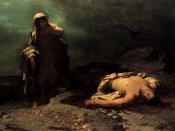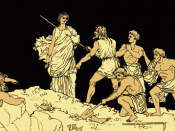Antigone: Literary Analysis
Love can play a big part in life, and sometimes love can penetrate the mind so deeply that one is willing to sacrifice one's self for their loved one. In the play "Antigone" by Sophocles, Antigone wishes to provide her fallen brother, Polyneices, with a proper burial after he is denied by the king, Creon, for opposing Creon's force during a war. However, despite the penalty of death, enforced by the law King Creon put up against the burial of Polyneices, she buried her brother under cover. Another conflict Antigone encounters is her very own sister trying to talk her out of the plan. Despite conflicts and "roadblocks", following in what one believes in and continuing until success is achieved is what drives not only Antigone, but many other successful people throughout history and even today.
The first road block Antigone encounters is her own sister, Ismene. Ismene, fearing her sister's deathas a result of Creon's law, tries to stop Antigone from even going near the body by trying to talk her out of it. Antigone calls her sister a traitor to the family and realizes that she is alone in her thoughts of breaking the law and burying her brother. However, Antigone does not view this "law-breaking" as a crime, but as a holy act: "If this is what you think, I should not want you, even if you asked to come. But I will bury him, and if I must die, I say this crime is holy: I shall lie down with him in death, and I shall be as dear to him as he to me." (Pg. 493 line 53-58)
Many people are afraid of breaking the law because of the punishments that follow. Most people do not break the...


